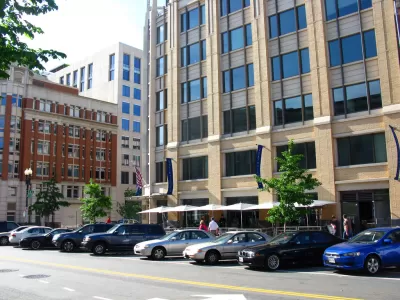Not everyone likes the proliferation of back-in angle parking in St. Louis, but the city is committed

An abundance of wide streets is one of the reasons driving St. Louis traffic planners to add more back-in angle parking in the city. However, it is causing anxiety among some drivers who dislike the practice, and some go out of their way to park elsewhere.
The city cites more efficient use of public space and traffic calming as reasons to stripe more than 500 spaces across the city in recent years. It's also generally safer to back in to a space rather than back out. Businesses generally like them as well, due to the fact that more parking is created than typical parallel spaces. So, despite anxiety from some drivers, back-in angles parking appears here to stay in St. Louis.
FULL STORY: Back-In Angle Parking Is in St. Louis to Stay. We'd Better Get Used to It

Planetizen Federal Action Tracker
A weekly monitor of how Trump’s orders and actions are impacting planners and planning in America.

Map: Where Senate Republicans Want to Sell Your Public Lands
For public land advocates, the Senate Republicans’ proposal to sell millions of acres of public land in the West is “the biggest fight of their careers.”

Restaurant Patios Were a Pandemic Win — Why Were They so Hard to Keep?
Social distancing requirements and changes in travel patterns prompted cities to pilot new uses for street and sidewalk space. Then it got complicated.

California Homeless Arrests, Citations Spike After Ruling
An investigation reveals that anti-homeless actions increased up to 500% after Grants Pass v. Johnson — even in cities claiming no policy change.

Albuquerque Route 66 Motels Become Affordable Housing
A $4 million city fund is incentivizing developers to breathe new life into derelict midcentury motels.

DC Area County Eliminates Bus Fares
Montgomery County joins a growing trend of making transit free.
Urban Design for Planners 1: Software Tools
This six-course series explores essential urban design concepts using open source software and equips planners with the tools they need to participate fully in the urban design process.
Planning for Universal Design
Learn the tools for implementing Universal Design in planning regulations.
Heyer Gruel & Associates PA
JM Goldson LLC
Custer County Colorado
City of Camden Redevelopment Agency
City of Astoria
Transportation Research & Education Center (TREC) at Portland State University
Camden Redevelopment Agency
City of Claremont
Municipality of Princeton (NJ)




























